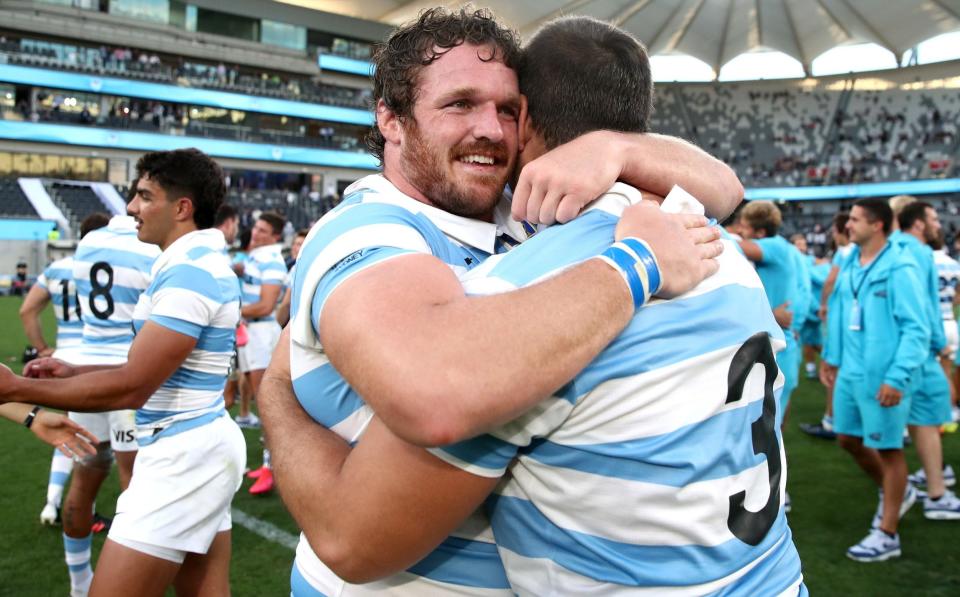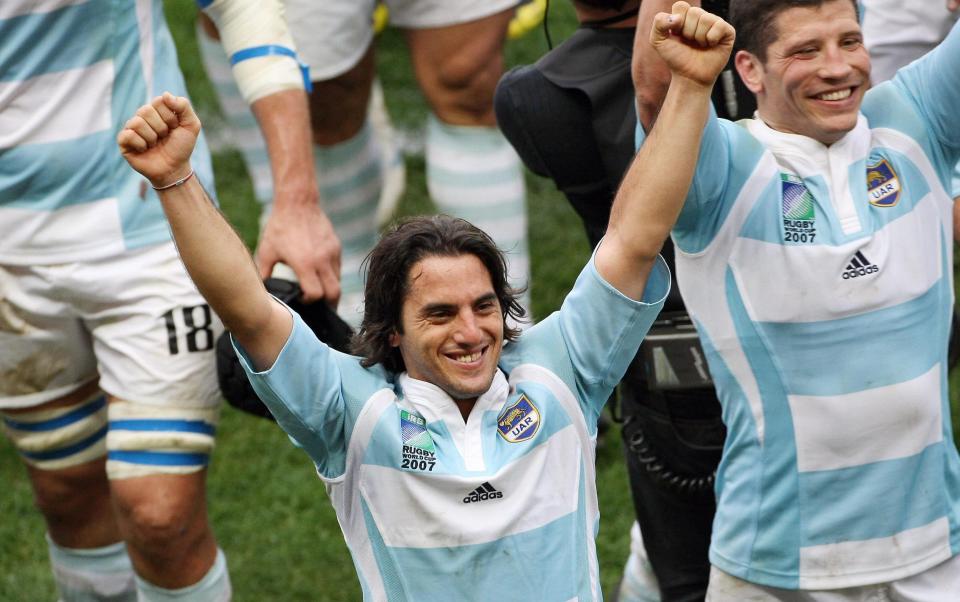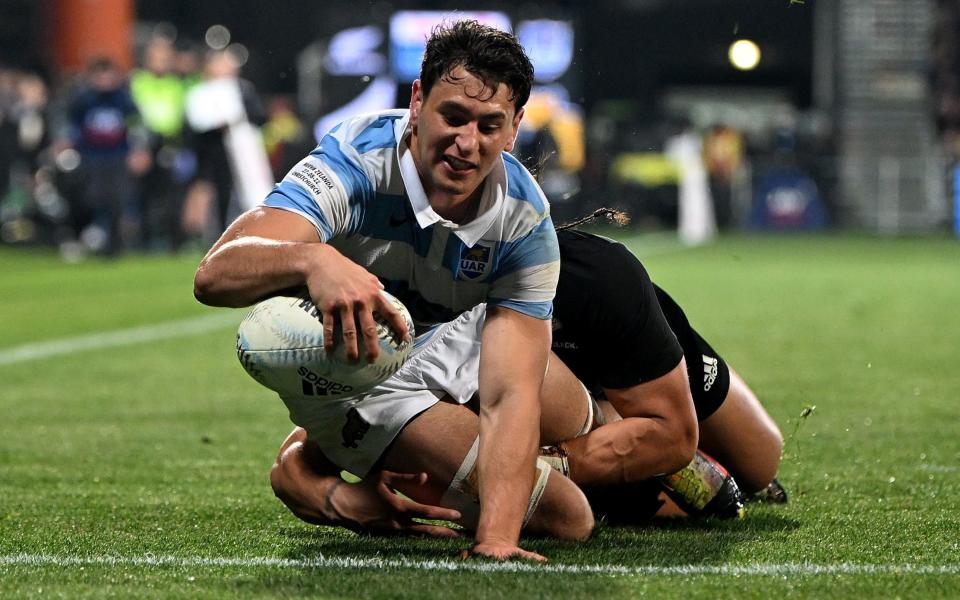Argentina no longer World Cup’s plucky underdogs – and here is how to beat them

“In the past, we’ve been treated as underdogs,” says Juan Figallo, the former Argentinian prop who represented his country at three World Cups. “But we never felt like that as a team. We’ve always felt like we can beat everyone.”
It is an apt assessment for a nation that has a rich treasure trove of stories at Rugby World Cups. Few can forget Argentina’s fairytale run at the 2007 tournament when, armed with their indefatigable trio of Felipe Contepomi, Mario Ledesma and Agustin Pichot, they twice stunned hosts France.
Their third-place finish, which is still regarded as one of the country’s finest sporting success stories, would pivot Argentinian rugby into a new era.

Fast forward to 2023, and Los Pumas’ rugby stock, unlike England’s, has continued to soar. Their past World Cup cycle has been studded with two historic wins over the All Blacks, a series victory over Scotland and a first victory at Twickenham last autumn.
It is little wonder they have moved above England in the world rankings for the first time since 2016, making them unlikely favourites against Steve Borthwick’s side when the two face off in Marseille on Saturday.
And yet, according to Opta’s predictor, Argentina – a country bidding to reach its third World Cup semi-final following their fourth-place finish in 2015 – have a 5.7 percent chance of lifting the trophy in France, making them fifth favourites, while bookmakers have odds of 20-1 for them to go all the way.
So why is it that this football-mad South American country, who will seek to pull off the rather remarkable feat of becoming the first nation to reach both Fifa and Rugby World Cup finals in the same cycle, are continually underrated with the oval-shaped ball?
Argentina have recorded their highest averages for points scored, metres made, line breaks and defenders beaten this year, as well as showing consistent progress with their set-piece. Their marked improvement can be traced to their head coach Michael Cheika, who took over in March 2022 and whose impact on Argentina has been a transformative one.
The former Wallabies head coach has a history of courting controversy for his animated changing room outbursts, having famously berated Australia with a fiery half-time rant – ironically against the side he now coaches – in 2018. Those sprays have abated in his role as Argentina’s head coach.
Already fluent in Arabic, French and Italian, Cheika made it his personal mission to learn Spanish after taking the top job in Argentinian rugby, even conducting training sessions and press conferences in the language. “It might not make you score tries, but it makes you play for your coach,” says Frankie Deges, an Argentina rugby journalist who has covered the Pumas for four decades. That Argentina have averaged double the number of tries this year than they did in 2021 before Cheika arrived is a case in point.
As the current forwards coach for Saracens women, Figallo has taken a keen interest in Argentina’s scrum, one of the weaker facets of their game. The loss of stalwart tighthead prop Nahuel Tetaz Chaparro, who ruptured his Achilles tendon during the team’s training camp in Portugal last month, and Bristol Bears lock Santiago Grondona, who cruelly suffered an ACL injury in Argentina’s 62-3 warm-up annihilation of Spain a fortnight ago, are sizeable blows to a forwards pack that, while solid, has plateaued since 2020.
But in a measure of their effectiveness, Argentina still sit second, behind South Africa, for the number of tries (2.6) originating from the scrum and lineout since July this year. England (1.2) sit second from bottom.
“The scrum is iffy at the moment, but good enough to compete against England and good enough to compete against Australia in the quarter-finals,” insists Figallo. “We’ve got size, we’ve got power. They should be quite a complete team.”
With the likes of captain Julian Montoya and centurion Agustin Creevy, who will play in their third and fourth World Cups respectively, Argentina’s squad is brimming with big-game experience, boasting over 1,000 Test caps.
But it is the 22-year-old Juan Martin Gonzalez, the Saracens-bound flanker, who is the unlikely cog in a well-oiled machine. “He’s a captain in the making,” says Deges of the 24-time capped open-side. “He can run, he can tackle. When you don’t actually see him, it’s because he’s doing the dirty work. He’s the full product.”

That predatory power is finely balanced with raw pace out wide along with kicking tacticians. From Emiliano Boffelli, Argentina’s utility back to their dynamic fly-half, Santiago Carreras, they have developed a well-rounded backline under the watchful eye of Contepomi, who spent four years priming the Leinster attack before linking up with Cheika last year.
“This current team has a pride that I’ve never seen before. It surprises me that they are always underestimated, because they can beat anyone in their day,” says Les Cusworth, the former Leicester Tigers and England fly-half who emigrated to Argentina where he helped bridge the gap between amateurism and professionalism with the creation of four high performance centres across Buenos Aires in the noughties.
Cusworth was stunned to find a fierce undercurrent of rugby in Argentina’s capital when he left his job as the managing director at Rugby School in 2002 to take up an unpaid role as technical director for the national team. “I’d always thought that England was the bastion of World Rugby,” he says. “But in Argentina, when British and Irish immigrants built the railways in Western Buenos Aires [in the 19th century] they put rugby clubs near all the stations. Most people don’t realise the history of formation of rugby goes way back, beyond most traditional clubs in the UK.”
Argentina have been equally astute when it comes to their World Cup preparation. Ahead of the 2007 edition, they played a solitary, low-key friendly with Belgium. “I can’t understand all these pre-tournament games,” says Cusworth, referencing England’s chaotic build-up. “Two against Wales, one against Ireland. One against a fired-up Fiji. I look at that, and I look at the philosophy that Argentina have had for over 20 years before World Cups, which is to work under the radar.”
He is equally keen to dispel any idea that this is a team burdened by the history-makers of yesteryear. “They no longer have the Agustin Pichots, the Mario Ledesmas or the Felipe Contepomis, but they’re still a wonderful side,” says Cusworth who, like many, is convinced Argentina’s days as the plucky underdog are over.
How to beat the Pumas
By Charlie Morgan
Pin them back
Argentina do not need a lot of ball to win matches. Led by Pablo Matera and Julián Montoya, they compete fiercely at the breakdown and galvanise themselves with turnovers. Marcos Kremer and Tomás Lavanini are thwacking tacklers. When they beat New Zealand 25-18 in Christchurch last August, the Pumas only spent 56 rucks in possession. A couple of months later at Twickenham, they only registered 39 rucks in possession – an extremely low number. In both games, they kicked a fair amount. Staying patient and kicking long is a canny strategy against them, as long as space is found and the chase is disciplined.
Shifting targets and plenty of passing
Handling errors blighted England’s warm-up fixtures but they cannot clam up because that would only invite more pressure. Predictable, narrow phase-play will be chewed up by Argentina’s robust defence. Alex Mitchell can be influential here. As he has shown in flashes for England, the 26-year-old is a fantastic conductor of zippy, zig-zagging attack. Tip-passes on the gain-line will also be useful – crucial even – as Montoya, Matera and other jackallers prowl. It goes without saying that England’s efficiency when they do breach Argentina’s 22 has to be better than they have shown since the last World Cup, because the Pumas are not short of firepower themselves.
Be alert to ‘lightning bolts’
Moments of magic from rival strike-runners are labelled as ‘lightning bolts’ in trendy coaching jargon. Argentina have the capacity to conjure them with regularity. Mateo Carreras, a highly elusive and deceptively strong wing, has been confounding Premiership defences since arriving at Newcastle Falcons two years ago. He cannot be afforded room to scamper from loose kicks. Felipe Contepomi, the Pumas’ assistant coach, borrowed a wrap-around move from Leinster, his old team, to fox England at Twickenham in November. Santiago Carreras, an athletic fly-half, was key to outflanking the hosts’ midfield and Emiliano Boffelli, on the wing this weekend with Juan Cruz Mallía at full-back, scored in the corner. Contepomi is sure to have a trick or two up his sleeve for Sunday.
Win the penalty count
Tactical clarity and work-rate were two hallmarks of Leicester Tigers under the guidance of Steve Borthwick and Aled Walters, but discipline was another non-negotiable. Richard Wigglesworth accentuated the value of low penalty counts during his short stint as head coach at Welford Road last season. England must heed the same lessons to oust Argentina and earn a much-needed victory. In Boffelli, the Pumas have an elite goal-kicker capable of punishing lapses. He landed six penalties and a conversion, for a 20-point haul, at Twickenham in November. Robust mauling can be a ticket to frustrating the Pumas, who occasionally rub up referees the wrong way. Lavanini has collected a deck of cards over his career, while the breakdown aggression of Montoya and Matera is not always rewarded. Mathieu Raynal is the man in the middle, with a pivotal job to do, in Marseilles.

 Yahoo Sport
Yahoo Sport 





































